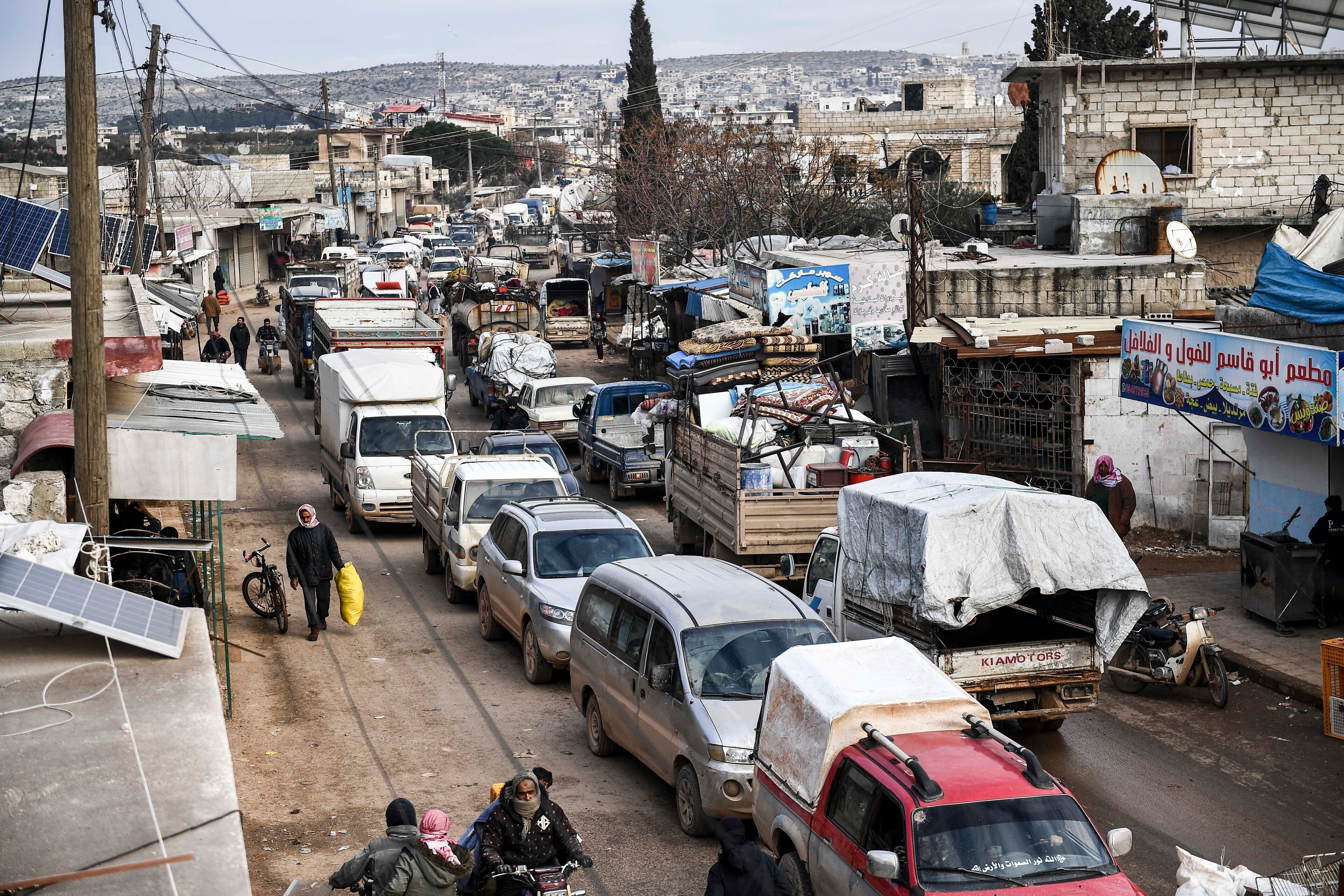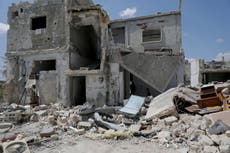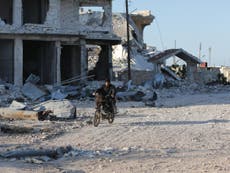Syria’s Assad and Russia’s Putin should be sanctioned for possible war crimes, says human-rights group
Report identifies 10 senior civilian and military officials who it says may be implicated in crimes against humanity

Governments should impose sanctions on President Bashar al-Assad of Syria, Russia’s President Putin and senior military officials for their involvement in possible war crimes in Syria’s Idlib, Human Rights Watch says in a new report.
The document, entitled Targeting Life in Idlib, investigates 46 attacks between March last year and March this year that killed hundreds of civilians in the war-ravaged northern province.
It identifies 10 senior Syrian and Russian civilian and military officials, including Mr Assad and Mr Putin , who may be implicated in war crimes and crimes against humanity committed during the year-long campaign.
Human Rights Watch (HRW) has urged governments to consider imposing unilateral targeted sanctions against these officials, since a deadlock in the UN security council has prevented the situation in Syria from being referred to the International Criminal Court.
Among the other Russian figures singled out is defence minister Sergei Shoigu, as well as three commanders of the Russian forces in Syria: Col Gen Andrei Nikolaevich Serdyukov; Col Gen Sergei Vladimirovich Surovikin, and Lt Gen Alexander Yuryevich Chaiko. Two of these commanders were reportedly awarded the Hero of Russia, the nation’s highest honorary title, for their command over troops in Syria.
Both countries have repeatedly and vehemently denied accusations of war crimes or that they have intensified attacks on civilians.
But Richard Weir, one the authors of the report, said that Damascus and Moscow were repeatedly blamed for attacks on civilians during the 21 UN Security Council meetings that took place over the course of the offensive, but nothing was done due to Russian and Chinese vetoes.
“Now is the time for states to give meaning to their endless streams of condemnations by pursuing prosecutions of those most responsible in their jurisdictions and by imposing targeted sanctions on them,” he told The Independent.
“The most alarming aspect of this research was seeing just how many times the Syrian and Russian militaries repeatedly attacked and damaged civil infrastructure without any lawful explanation.
“The longer the offensive went on, the more damage was done to schools, hospitals and markets, and the more civilians suffered,” he added.
One of the deadliest attacks documented in the report was a raid last year that hit several apartment buildings, nearby shops and a market, in Maarat al-Nu’man, killing 43 people.
A Syrian civil defence worker told HRW there were “bodies everywhere – women, bits of children”.
Another worker said: “I remember one boy who had been carrying vegetables in his hands when he was killed. His severed hands were still gripping them.”
Last April Syrian government forces, backed by Russian air power, launched an assault to capture the northwest Idlib region, the final pocket of opposition in the country after nine years of civil war. Most of Idlib is controlled by Hayat Tahrir al-Sham (HTS), a jihadist group listed as terrorists by the US, Turkey and others.
The United Nations said that at least 1,600 civilians were killed and more than a million displaced in the 11-month campaign.
In March, Russia and Turkey, which backs opposition fighters in Idlib and lost troops in Syrian government attacks, agreed to a ceasefire, although sporadic fighting continues.
After reviewing more than 500 photos and videos, and interviewing at least 100 victims and witnesses, HRW pieced together dozens of strikes on Ariha, Idlib city, Jisr al-Shughour and Maarat al-Nu’man.
The group found no evidence of opposition military presence around the targeted sites that included four camps for displaced people, as well as 12 hospitals, 10 schools, five markets, a prison and a church.
HRW said this suggested the attacks were “deliberate” and probably aimed at forcing the civilian population to flee, facilitating capture of territory.
The report also investigates an attack that hit a building housing a pre-school group and several instances where hospitals were damaged, including the destruction of Ariha’s only medical centre in a strike that killed 14 civilians and wounded at least 66 others.
“People have stopped going into the basements to seek shelter,” said one Ariha resident, describing life under bombardment. “They go into the streets or onto the rooftops, so that it’s easier for rescue workers to find their bodies.”
Zeroing in on Russia’s tactics in Syria, HRW said that massive destruction and damage to civilian infrastructure was part of a broader strategy of “punishment”, likening it to Russia’s destruction of Grozny during the second Chechen war in 1999-2000.
The report also focused on the Kremlin’s repeated and public acknowledgement that Russia has used the Syrian conflict as a testing ground for weapons, reconnaissance systems and operational procedures.
The group said it was not aware of any efforts by the Syrian or Russian governments to credibly investigate or stop the attacks on civilians or civilian infrastructure.
Russian officials followed up on reports of civil casualties after the attack on a market in Maarat al-Nu’man, but HRW said they identified the wrong location.
Russia has repeatedly denied involvement in any strikes that have hit civilian infrastructure.




Join our commenting forum
Join thought-provoking conversations, follow other Independent readers and see their replies
Comments